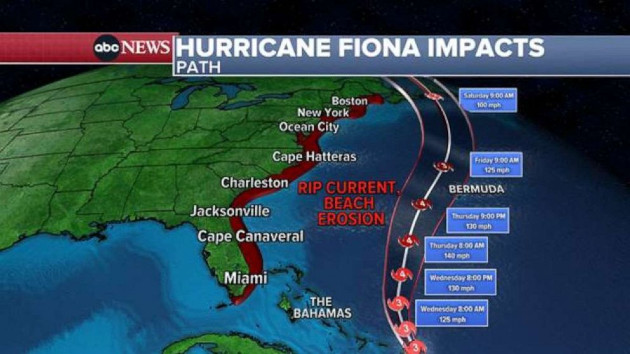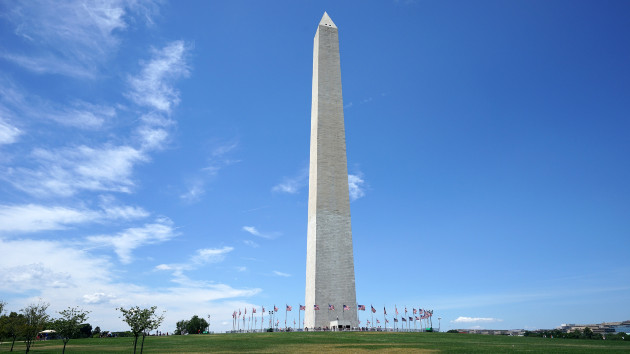
(NEW YORK) — Puerto Rico is facing yet another devastating hurricane that has knocked out electricity across the island, just as the five-year anniversary of the deadly, destructive Hurricane Maria passes.
President Joe Biden has authorized FEMA to supply federal emergency aid to the Commonwealth of Puerto Rico in response to Hurricane Fiona, which touched down on Sept. 17 after strengthening from a tropical storm.
More than 1.5 million people are without electricity as torrential rain, 85-mph winds, and what the National Hurricane Service calls “catastrophic” flooding, pummels the U.S. territory.
Here are organizations helping deliver relief efforts in the wake of this latest hurricane:
United Nations World Food Programme: international disaster relief
The United Nations group is on the ground providing relief assessment emergency equipment to support recovery efforts in the Dominican Republic following severe flooding and power outages.
The U.N. is one of the world’s largest humanitarian organizations, working with victims of climate change, conflict and other disasters.
GoFundMe: hosting personal fundraisers
GoFundMe has dedicated a page to verified fundraisers for people affected by the hurricane in Puerto Rico and the Dominican Republic.
“We are working around the clock to ensure the families, businesses and communities affected receive the quick and trusted support they need,” GoFundMe said in a statement.
Verified fundraisers are vetted by GoFundMe, and funds are held until the recipients can be added to the fundraiser to withdraw the money themselves.
Hispanic Federation: a coalition of organizations rebuilding Puerto Rico
The Hispanic Federation has helped rebuild homes, health centers and farms, supply solar panels, and more through community-based projects following the devastation of Hurricane Maria. The federation responded then by supplying 25 relief planes that carried 7.4 million pounds of food, water, medicine, solar panels and resources to the island and coordinated with mayors on the ground to organize donation delivery.
In the wake of Hurricane Fiona, Hispanic Federation is already on the ground providing emergency relief services.
Their efforts have been combined with hyperlocal organizations such as La Maraña and ViequesLove that focus on different aspect of recovery, many of which were born out of the needs highlighted by Hurricane Maria.
PRxPR: disaster relief fund donating 100% of funds
The PRxPR Relief and Rebuild Fund, run by the Conservation Trust of Puerto Rico, has delivered humanitarian aid to the island in the wake of Hurricane Maria’s devastation. Maria killed roughly 3,000 people and left the infrastructure of the country devastated.
The fund works with local organizations to address basic, economic, agricultural and energy needs in an effort to provide immediate and long-lasting relief to communities.
Fundación Comunitaria de Puerto Rico (The Puerto Rico Community Foundation)
The Puerto Rico Community Foundation has been working for more than 35 years to increase access to renewable energy, drinking water, housing, education and economic development for the people it serves.
The foundation has reactivated the Community Recovery Fund for Puerto Rico to help recovery efforts following Hurricane Fiona.
Foundation for Puerto Rico
The Foundation for Puerto Rico was created to “unleash Puerto Rico’s potential in the global economy.” Now, the organization plans to prioritize relief in the wake Hurricane Fiona, calling for donations and volunteers.
“Our priority is to focus on the emergency that the country is facing and achieve the recovery of Puerto Rico together,” said the organization in a tweet.
SBP: disaster management headed to Puerto Rico
SBP is a nonprofit based in New Orleans, Louisiana, that was created after two volunteers saw what they called “the inefficiency and unbearably slow progress” of institutional or traditional rebuilding processes in Louisiana following Hurricane Katrina. The group aims to reduce the time between when a disaster hits and when recovery reaches those affected.
SBP says as soon as weather conditions are safe, it will touch down in Puerto Rico to help recovery efforts.
The group will “partner with local and regional organizations to establish contact lists and distribute recovery supplies to impacted communities,” according to the SBP website.
It said it will “connect with state, parish, and municipal leaders in affected areas to ensure survivors and communities secure access to vital recovery resources, protect survivors from fraud, and set clear and aggressive recovery goals to build back quickly and more robust than before.”
Copyright © 2022, ABC Audio. All rights reserved.









